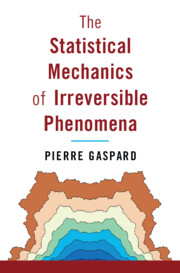Book contents
- Frontmatter
- Dedication
- Contents
- Preface
- 1 Thermodynamics
- 2 Statistical Mechanics
- 3 Hydrodynamics
- 4 Stochastic Processes
- 5 Fluctuation Relations for Energy and Particle Fluxes
- 6 Path Probabilities, Temporal Disorder, and Irreversibility
- 7 Driven Brownian Particles and Related Systems
- 8 Effusion Processes
- 9 Processes in Dilute and Rarefied Gases
- 10 Fluctuating Chemohydrodynamics
- 11 Reactions
- 12 Active Processes
- 13 Transport in Hamiltonian Dynamical Models
- 14 Quantum Statistical Mechanics
- 15 Transport in Open Quantum Systems
- Appendix A Complements on Thermodynamics
- Appendix B Complements on Dynamical Systems Theory
- Appendix C Complements on Statistical Mechanics
- Appendix D Complements on Hydrodynamics
- Appendix E Complements on Stochastic Processes
- Appendix F Complements on Fluctuation Relations
- References
- Index
6 - Path Probabilities, Temporal Disorder, and Irreversibility
Published online by Cambridge University Press: 14 July 2022
- Frontmatter
- Dedication
- Contents
- Preface
- 1 Thermodynamics
- 2 Statistical Mechanics
- 3 Hydrodynamics
- 4 Stochastic Processes
- 5 Fluctuation Relations for Energy and Particle Fluxes
- 6 Path Probabilities, Temporal Disorder, and Irreversibility
- 7 Driven Brownian Particles and Related Systems
- 8 Effusion Processes
- 9 Processes in Dilute and Rarefied Gases
- 10 Fluctuating Chemohydrodynamics
- 11 Reactions
- 12 Active Processes
- 13 Transport in Hamiltonian Dynamical Models
- 14 Quantum Statistical Mechanics
- 15 Transport in Open Quantum Systems
- Appendix A Complements on Thermodynamics
- Appendix B Complements on Dynamical Systems Theory
- Appendix C Complements on Statistical Mechanics
- Appendix D Complements on Hydrodynamics
- Appendix E Complements on Stochastic Processes
- Appendix F Complements on Fluctuation Relations
- References
- Index
Summary
The stroboscopic observation of stochastic processes records the history of the system as paths, which can be characterized by their probability distribution. Temporal disorder results in the exponential decay of the path probabilities as the observational time increases. The mean decay rate defines the so-called entropy per unit time, which measures the amount of temporal disorder in the process. At equilibrium, the probabilities of a path and its time reversal are equal by the principle of detailed balance. In contrast, they differ under nonequilibrium conditions, which is the manifestation of irreversibility. Remarkably, the ratio of the probabilities of opposite paths has a logarithm obeying a fluctuation relation and having a mean value related to the thermodynamic entropy production rate. These results show that temporal ordering can be generated in nonequilibrium processes as a corollary of the second law. These considerations shed new light on Landauer’s principle.
Keywords
Information
- Type
- Chapter
- Information
- The Statistical Mechanics of Irreversible Phenomena , pp. 257 - 295Publisher: Cambridge University PressPrint publication year: 2022
